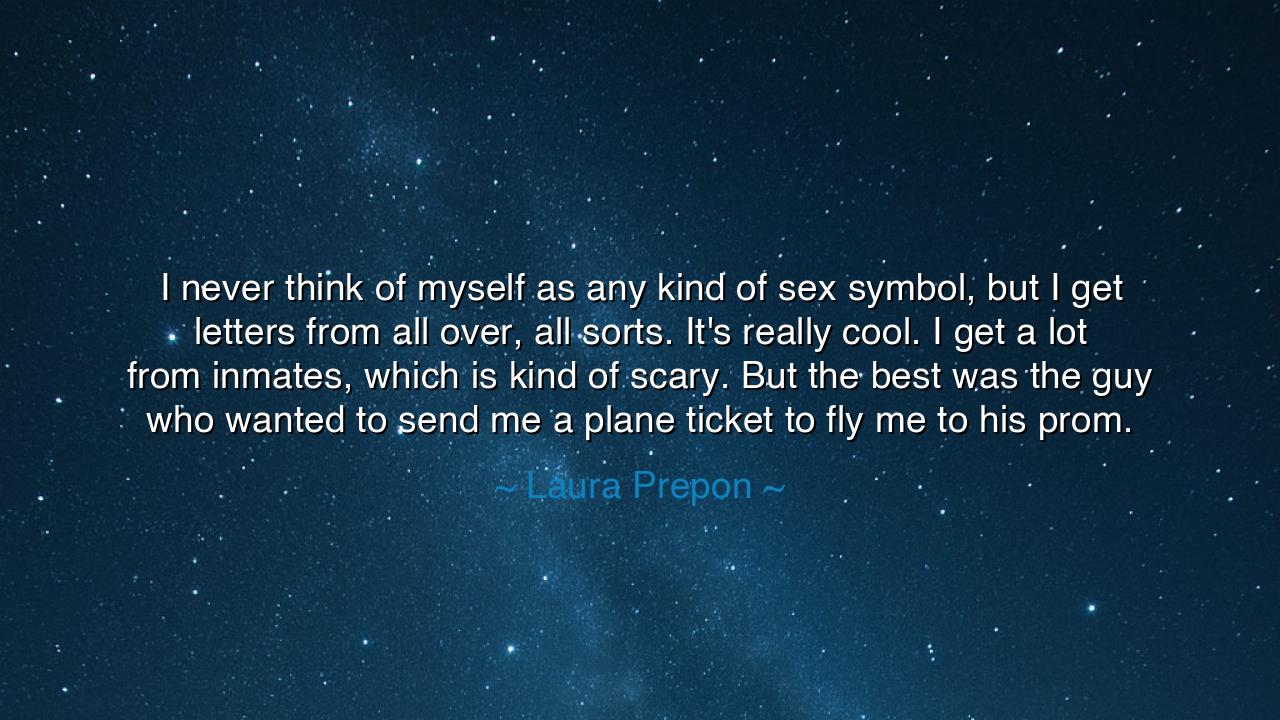
I never think of myself as any kind of sex symbol, but I get
I never think of myself as any kind of sex symbol, but I get letters from all over, all sorts. It's really cool. I get a lot from inmates, which is kind of scary. But the best was the guy who wanted to send me a plane ticket to fly me to his prom.






The actress Laura Prepon, known for her strength, wit, and quiet humility, once said: “I never think of myself as any kind of sex symbol, but I get letters from all over, all sorts. It’s really cool. I get a lot from inmates, which is kind of scary. But the best was the guy who wanted to send me a plane ticket to fly me to his prom.” Though spoken with humor, her words carry a deeper truth — one that speaks to fame, perception, and the mysterious ways in which the world projects its dreams upon those who rise into its light. Beneath her laughter lies the ancient reminder that how others see us is not always how we see ourselves, and that humility, even in the face of adoration, is the mark of true grace.
To say “I never think of myself as a sex symbol” is to reveal the wisdom of self-awareness in a world drunk on illusion. It is a declaration of balance, a refusal to be defined by the gaze of others. Prepon’s words remind us that beauty, fame, and admiration — though powerful — are fleeting reflections, not the essence of one’s being. In every age, those who ascend into public view have found themselves trapped between who they are and who others imagine them to be. Yet Prepon laughs at this paradox, meeting it not with pride, but with good humor — a sign of one who knows her own worth and therefore cannot be swayed by either flattery or fear.
The origin of her insight comes from the nature of stardom itself, which is as old as the human fascination with light. In the days of the ancients, actors upon the stage or warriors in the arena were admired as if touched by the divine — yet they, too, were mortal. The philosopher Marcus Aurelius, himself an emperor admired by millions, warned against the intoxication of fame, saying, “All is fleeting — the applause, the memory, the praise of others.” Prepon’s reflection follows in this tradition, reminding us that admiration from afar is not a mirror of truth but a shadow of longing. Those who write her letters — the inmates, the dreamers, the lonely hearts — project upon her not who she is, but who they wish her to be.
And yet, she meets it not with disdain, but with curiosity and compassion. “It’s really cool,” she says — for she recognizes that even in their oddness, these letters are born of human yearning. They are signs of connection, however misplaced, between one person and another. The plane ticket from a boy who wanted to bring her to his prom speaks not of madness, but of innocence — the eternal human desire to reach for something or someone who seems beyond one’s grasp. Prepon’s response — amused, gentle, unthreatened — reveals a heart uncorrupted by fame. She has learned, as the sages once taught, that to be admired is not a burden when one’s identity rests firmly in truth.
History is filled with those who failed to learn this balance. Consider the tale of Cleopatra, whose legendary beauty ensnared emperors and defined an era. Though her charm was mighty, it was her awareness of its power — and her belief in its permanence — that led to her fall. She became a prisoner of her own image. Prepon, by contrast, chooses detachment. She laughs at the image others create of her, refusing to let it define her spirit. In this laughter lies freedom — the same freedom the Stoics called ataraxia, the unshakable peace of a soul unmoved by praise or judgment.
There is also a gentler lesson hidden in her words — one about the nature of connection itself. Those who send her letters, even from the shadows of confinement, remind us of the universal longing for beauty, contact, and recognition. The world writes its dreams upon those who seem to shine more brightly. But the wise know that the true light is not in appearance, but in authenticity. Prepon does not reject her admirers; she merely keeps their devotion in perspective. She understands that fame, like the moon, glows not with its own light but with the borrowed reflection of the sun.
The lesson, then, is both simple and profound: remain humble, no matter how brightly the world shines upon you. Whether in fame or obscurity, in praise or criticism, remember that your worth is not defined by others’ perceptions. Laugh when the world tries to crown you, and stay grounded in who you truly are. If others idealize you, accept their admiration with gratitude but not attachment. If others misunderstand you, meet them with patience rather than bitterness. For the opinions of the world are as shifting as the wind — only self-knowledge endures.
So let Laura Prepon’s words stand as a light for all who rise into visibility — whether in art, success, or daily life. To be admired is to be seen through a thousand eyes, but to remain true is to see oneself clearly through one’s own. Smile at the letters, the praise, the fantasies of others — but never forget the person who writes, acts, creates, and lives from the quiet core within. For that inner truth, unchanging and unseen, is the one light no gaze can distort — the light of authenticity, the calm flame of self-understanding that guides the soul through the bright chaos of the world.






AAdministratorAdministrator
Welcome, honored guests. Please leave a comment, we will respond soon